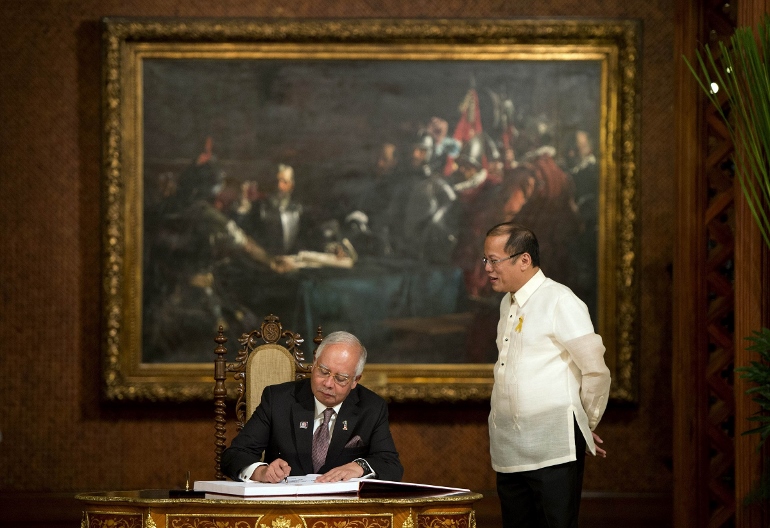
Philippine President Benigno Aquino stands beside Malaysia's Prime Minister Najib Razak as he signs the guest book at Malacanang Palace in Manila, before the signing of a peace pact with the Moro Islamic Liberation Front March 27. (CNS/Reuters/Noel Celis, pool)
Decades of bloody conflict that claimed tens of thousands of lives was declared over when the Philippine government on Thursday signed a peace agreement with the Moro Islamic Liberation Front.
With the peace agreement, or the Comprehensive Agreement on the Bangsamoro (CAB), the MILF turns from 40 years armed struggle for an independent, Muslim homeland, in exchange for a self-governing autonomous region in the south that will cover about 10 percent of the Philippines land area.
Families will no longer have to be ripped apart by armed fighting and forced into lives of danger and suffering, Teresita Deles, the Philippines presidential adviser on the peace process, said in a welcoming address at the signing ceremony.
"Enough! We are all tired of [war]. A new dawn has come," Deles said as veiled women in the audience wiped away tears from their eyes.
Peace panel chairs Miriam Ferrer for the government and Mohagher Iqbal for the MILF signed the five-page agreement in the presence of President Benigno Aquino, MILF chairman Al Haj Murad Ebrahim and more than 1,000 invited guests, including foreign dignitaries and 500 MILF members.
Malaysia, which adjoins Mindanao and has strong cultural and religious ties with that southern Philippines group of islands, was instrumental in the 17-year long peace negotiations, which culminated Thursday. Malaysian Prime Minister NajibRazak attended the signing ceremony.
A political region called the Bangsamoro (Moro nation) will be created on predominantly Christian Mindanao to replace the Autonomous Region in Muslim Mindanao (ARMM) comprising provinces with predominantly Muslim populations.
Ferrer told reporters that the agreement seeks to “correct historical injustice,” done to Mindanao inhabitants by colonizers and migrants and to “equitably diffuse wealth and political power” on the island group.
It recognizes “the justness and legitimacy of the cause of the Bangsamoro people, their aspiration for meaningful autonomy through a democratic process; the aim of finding a solution to the Bangsamoro question with honor, justice and dignity.”
Church role
Cardinal Orlando Quevedo, Archbishop of Cotabato where the ARMM government is based, attended the signing.
He said in a televised interview he felt “great joy” and “hope” because the signing represents “almost the conclusion of long years” of Bangsamoro struggle for self-determination, which “led them to war” and in which “thousands of Muslims, Christians and Lumads have been killed.”
He called the agreement a “win-win solution” that bears “the fruit of a lasting and just peace." However, he stressed it requires more “hard and long work” involving “every citizen,” including Christians.
“Many of the Christians from outside of the Bangsamoro have a lot of fears and distrust," Quevedo said. "Some of our own Christians in the Bangsamoro territory have their own fears based on historical experiences of conflict between Christians and Muslims in the area, as well as centuries of bias and prejudice.”
Church leaders and workers can help members to “get rid of prejudice,” he said. “Filipinos up north on Luzon Island and on the central island group of the Visayas think of Mindanao as a place of conflict. And now I think they should begin to think of Mindanao as the place where a negotiated peace has been finally concluded that can be a model for peacemaking in Asia.”
Bangsamoro for all
Murad called the agreement “crowning glory” of the Bangsamoro struggle because it restored the identity, powers and resources of its people. He said it was a victory they shared with the Filipino people.
He stressed, "The MILF will only be the gatekeeper during the transition period,” after which democracy will operate. "To be more emphatic, it will not be a government of the MILF but a government of the Bangsamoro," he said.
"The CAB is not only for the MILF. It is for the Moro National Liberation Front as well, as much as it is for all Muslim ethnic tribes, Christian settlers and indigenous peoples in the prospective Bangsamoro territory," Murad added.
About four smaller armed groups, including MNLF are still active in Mindanao.
Next few months crucial
The new Bangsamoro region is expected to have a parliamentary form of government able to raise its own revenues and form its own law enforcement, among other powers. The central Philippines government would handle national defense, currency and postal services.
The Bangsamoro Transition Commission headed by Iqbal must submit a draft “basic law” to Aquino’s office by March 31 so that he can forward it to Congress. The basic law would create the autonomous region needed for the Comprehensive Agreement on the Bangsamoro to be implemented.
Aquino said he hopes Congress would pass the law by year’s end, so that in 2015 residents in the proposed region can vote in a referendum on the proposed new entity. Leaders for the territory would then be elected during the 2016 national elections when Aquino’s term ends. Until then, a "Bangsamoro Transition Authority" will govern the region.
Congressman Rodolfo Biazon told NCR on Wednesday that he expects the House of Representatives to raise questions on the “constitutionality” of the legislation. He said he would like to hear from a broad spectrum of voices from people, communities and sectors who would be affected by the newly defined Bangsamoro entity.
Aquino urged action at the Thursday signing. “If we sustain the momentum for peace, by 2016, the MILF will have shed its identity as a military force and transformed itself into a political entity, casting its stake in democracy by vying for seats in the Bangsamoro elections.”
[N.J. Viehland is an NCR correspondent based in the Philippines.]


